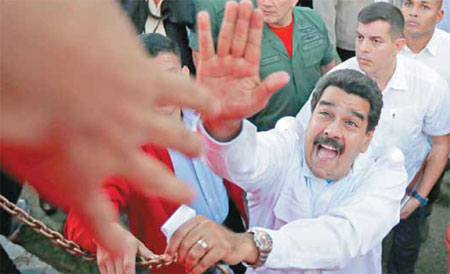Maduro seeks peace talks
Venezuelan president attempts to end three weeks of demonstrations
Venezuelan President Nicolas Maduro sought to hold a "peace conference" on Wednesday in an attempt to end three weeks of deadly anti-government protests in the oil-rich but deeply divided country.
But opposition leader Henrique Capriles is not attending, saying he is tired of what he calls government lies and police repression against student protesters.
Capriles, a state governor, was narrowly defeated by Maduro last year to succeed the late Hugo Chavez.
Maduro's gathering aims to bring together political, social and religious figures, but he has given no details over who has committed to taking part.
The protests have left at least 14 people dead and raised alarm in South America, the United States and Europe.
The country with the world's largest proven oil reserves has been rocked since Feb 4 by protests over crime, inflation, corruption and other woes.
The US has expelled three Venezuelan diplomats in response to similar action against three US consular officials in Caracas.
Venezuelan envoys First Secretary Ignacio Luis Cajal Avalos, First Secretary Victor Manuel Pisani Azpurua and Second Secretary Marcos Jose Garcia Figueredo, were given 48 hours to leave the US, the US State Department said on Tuesday.
Maduro expelled three US diplomats on Feb 17, saying they were supporting opposition plots to overthrow him.
White House spokesman Jay Carney took offense and said what is happening in Venezuela is an issue between Maduro and his people, not between Venezuela and the US.
"President Maduro needs to focus on addressing the legitimate grievances of the Venezuelan people through meaningful dialogue with them, not through dialogue with the US," Carney said. "Despite what the Venezuelan government would like to lead people to believe, this is not a US-Venezuela issue. It is an issue between Venezuela and its people."
"We've been clear all along that the future of Venezuela is for the Venezuelan people to decide," Carney said.
US State Department spokeswoman Jen Psaki cited US concerns about Venezuela's record on human rights and support for democracy, but said Washington remains open to a diplomatic relationship with Maduro. But she said Venezuela "needs to show seriousness" for the US to move forward with that process.
"Recent actions, including expelling three of our diplomats, continue to make that difficult," Psaki said.
The two countries have not exchanged ambassadors since 2010, though they have maintained embassies.
The atmosphere in Caracas was calmer on Tuesday after a night of sporadic clashes, although in some middle class neighborhoods streets were still partially blocked by barriers of rubble and garbage.
AFP-AP
|
Venezuela's President Nicolas Maduro greets supporters as he arrives at a rally with workers in Caracas, Venezuela, on Tuesday. Jorge Silva / Reuters |
(China Daily 02/27/2014 page10)















